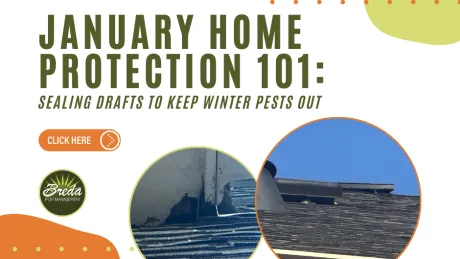Recently, a family contacted us with concerns. Their child has allergies—and they wanted to know if treating their home's bug problem could trigger an allergic reaction.
The topic of pesticide-related allergies is an especially interesting one. It's well known that the fine hair or dander found on pests such as rodents and cockroaches can trigger allergic reactions (and even asthma attacks in some cases). That said, not treating the home may be the worst choice possible.
But what about the chemicals used to treat these nuisances?
All pesticides are tested for allergic triggers before being put on the market, so they're no more likely to triggering allergic reactions than any other product. However, some ingredients can still cause reactions among sensitive portions of the population. For most people who run across allergens, the use of antihistamines or other over the counter medications seem to do the trick and help people feel better. In some cases, people must carry an epipen and inject it if they start having a serious allergic reaction. Unfortunately, the only way to truly avoid an allergic reaction is to avoid contact with the allergen. And the first step towards avoiding an allergen is to read the labels on any pesticides you use on your home. All pesticides include warning labels detailing the health effects and risks associated with the product.
That said, the Medical University of South Carolina suggests that the following chemicals have been reported to cause reactions in sensitive individuals: allidochlor, anilazine, antu, barban, benomyl, captafol, captan, dazomet, dichloropropane, dichloropropene, lindane, maneb, nitrofen, propachlor, pyrethrum/pyrethroids, rotenone, thiram,and zineb.
If you're like most people, your eyes glazed over while reading that list. This is why bringing in a pro may save you time. Call or email experts in this field for specific advice, or to schedule a treatment so that you don't have to worry about selecting the wrong pesticide, or applying treatment in a way that puts your family at risk.
If you do opt to treat your home on your own, there are several precautions you can take to limit your exposure to potential allergens: Use a premixed pesticide rather than one you have to mix on your own. When spraying outside, be conscious of the wind. If there is a breeze, always spray with the wind at your back. Before you treat an area, remove your pets' or childrens' toys to avoid contamination. If you are using pesticides in the kitchen, make sure that all food products are put up and/ or sealed. Lastly, if you have any doubts, err on the side of caution.
If anyone in your family begins to show signs of an allergic reaction, get them to a new environment as soon as possible. If the reaction is serious, seed medical attention. While, applying pesticides yourself is an option, it would be much wiser to contact a professional pest control service to spray pesticides, reducing your risk of an allergic reaction. Contact us today for a free consultation for all of your pest management needs.



